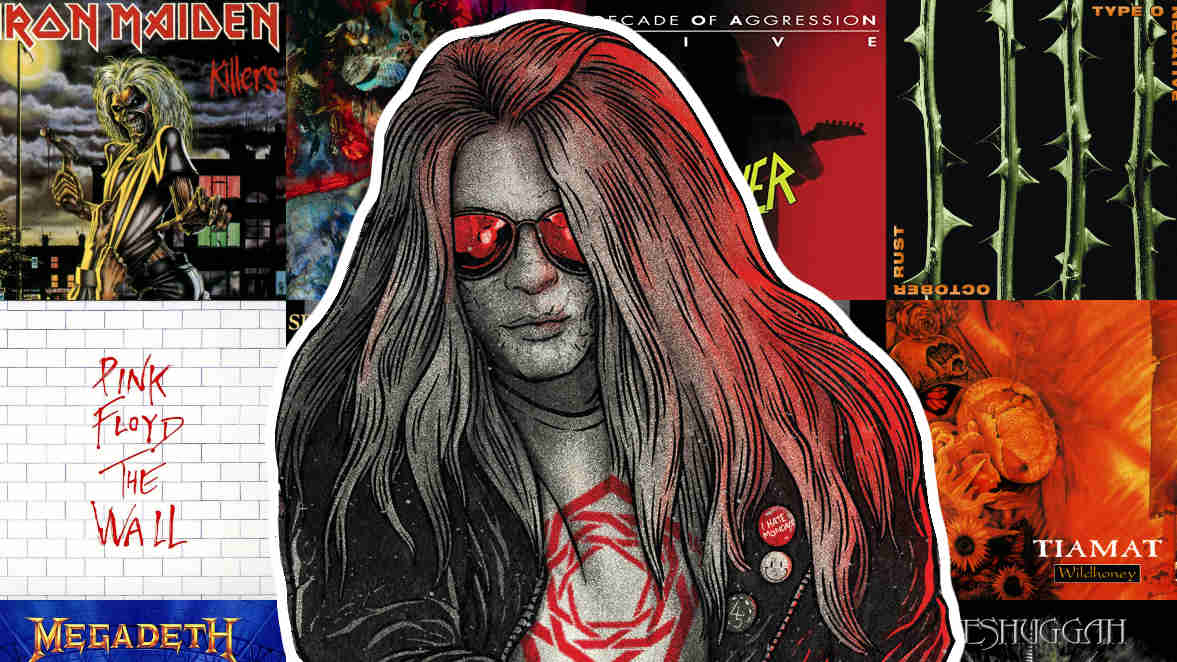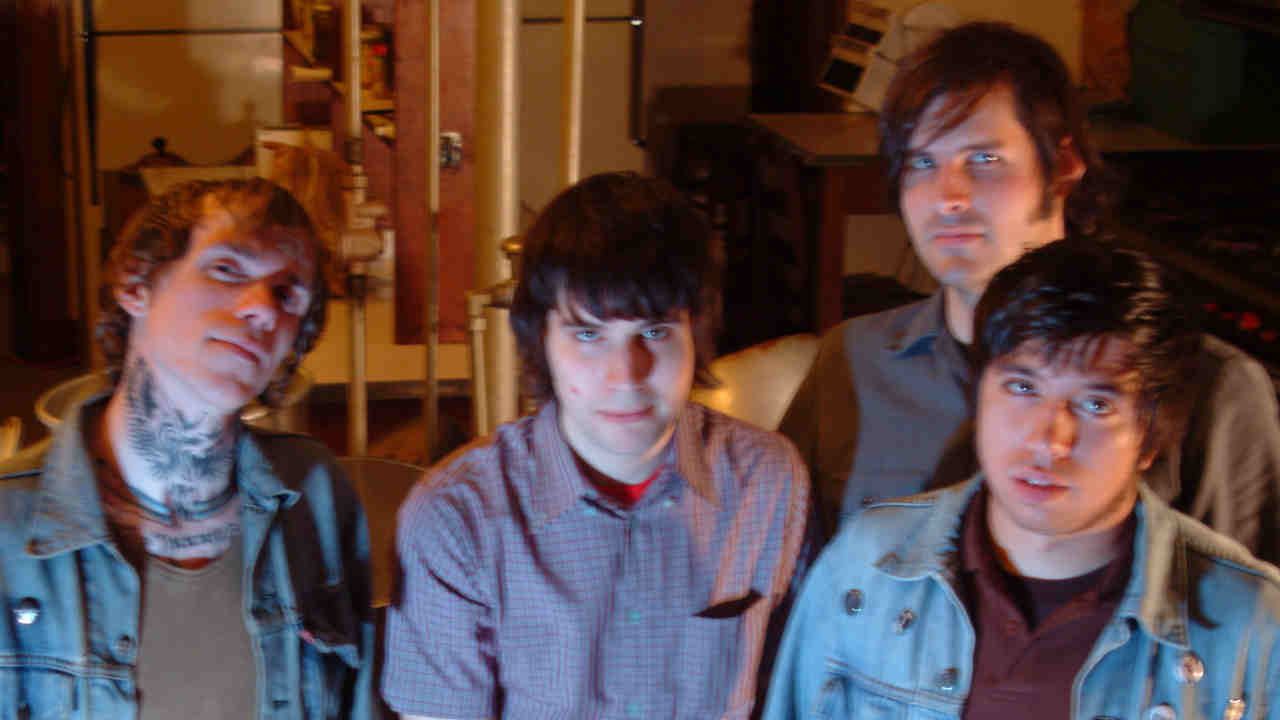Carpenter Brut: 10 albums that changed my life
Metallica, Meshuggah, Megadeth, Type O Negative, Tiamat – synthwave kingpin Carpenter Brut‘s record collection is metal all the way

Long before Franck Hueso became synthwave pioneer Carpenter Brut, he was a metal-loving kid from Poitiers in France. His musical journey saw him detouring off into other more electronic areas, but the likes of Metallica and Meshuggah brought him home. Today, he brings together both worlds, creating electronica with the attitude and aesthetics of metal and the ability to suck the listener in.
“That’s always been my aim with Carpenter Brut,” he says, as he prepares to run down the 10 albums that changed his life.. “All of my choices are reflections of what I want to do with my own project – sometimes I want the violence of a band like Slayer, other times the dream-like qualities of Tiamat or Paradise Lost.”
Take it away, Mr Brut…

Pink Floyd – The Wall (1979)
“I’m not really sure how I first discovered Pink Floyd, maybe through my father because he was listening to a lot of very 70s rock stuff when I was growing up – Santana, Supertramp and Pink Floyd. I think The Wall came first for me, as the first song I really remember was Another Brick In The Wall (Part 2), which I guess was the hit of the album. When I got older, I watched The Wall the movie with friends, which made me want to go back to the album because when you’re young you don’t really care about albums – you just care about the songs you like and make mixtapes of those.
“Going back, I discovered the cover for the first time, this white wall with graffiti on which I thought was really cool. Watching that movie made me go deeper into the album and the stories, as its all linked together and there are all these different vibes. For me, it was the first time I took an album out and really went into it, taking it upstairs and listening to it on the bed while reading the lyrics, looking at the art etc. It’s a voyage, transporting you… somewhere! I’d put this album on whenever I wanted to disappear from the real world – it was a ticket to somewhere else.”
Iron Maiden – Killers (1981)
“I’m a huge Iron Maiden fan. When I was young I tried to redraw the Maiden covers and Killers was one of my favourites, with the lighting and Eddie standing over the guy with a bloody axe – it’s one of the most violent covers in all the Maiden discography, caught in a killing act.
“Killers wasn’t the first Iron Maiden album I heard – that was actually Seventh Son Of A Seventh Son and they were the first heavy metal band I loved. I loved albums like Seventh Son and Somewhere In Time, Live After Death and in a way, even Fear Of The Dark, lots of Iron Maiden’s albums are really cool and really, really great, but for some reason I always found Killers the most interesting. I don’t know if it’s because Iron Maiden are more punk on Killers, but they still have that progressive vibe. It's interesting because its savage but you’ve got those melodical parts in there too, which makes for a really interesting mix and that makes it my favourite Iron Maiden album.”
Sign up below to get the latest from Metal Hammer, plus exclusive special offers, direct to your inbox!
Megadeth – Rust In Peace (1991)
“Rust In Peace has the best Megadeth guitar solos, the best Megadeth drums, the best Megadeth… everything! It’s all perfect on this album. It’s not too long, it’s not too short with nine songs, maybe some of my favourites by them – like Tornado Of Souls. I really loved the cover too, with Bush, Gorbachev and the other guys who I don’t really recognise, all members of world governments. It was very political, but Megadeth as a band were very political when they released this and Peace Sells, before they became more mainstream on Countdown To Extinction (which is also one of my favourites).
“It was the first with Marty Friedman and I think Rust In Peace is Megadeth at their most technical. Just look at a song like Lucretia, which just crams in the notes in such a short amount of time. And Dave Mustaine’s singing! I saw them live and couldn’t believe he was playing these parts while singing at the same time. I knew right then it was for real, not just something they’d done as a joke – they really could play that fast and that well.”
Metallica – Master Of Puppets (1986)
“Master Of Puppets has to be Metallica’s most iconic era. They had these huge tombstones on stage and this huge set-up and Cliff Burton’s influence on the band is so clear in their sound. It’s the last Metallica thrash album, so maybe the last real album. It’s a bit harsh to say that, but I’d love to know how they would have sounded around The Black Album if Cliff was still alive. It’s interesting, because even with …And Justice For All, the songs are getting more progressive, with some of their longest songs. Sometimes you’re like ‘where are they going with this song?’ and I get the feeling Cliff would have been the guy to go ‘maybe we shouldn’t play this riff?’ or to cut things down so it made more sense.”
Type O Negative – October Rust (1996)
“If I if I had to choose three bands to bring onto a desert island, it would be Pink Floyd, Type O Negative and Meshuggah. I discovered Type O Negative when they were in a French metal magazine. There was an article called ‘Thrasher Of The Month’ and Bloody Kisses had been chosen. I’d never heard of the band before, but seeing that made me want to go out and buy the CD. I put it on and I’m like, ‘What the fuck? This isn’t thrash at all!’ because it starts out very slow with a young woman and this guy with an incredibly deep voice, these slow, slow beats. Slow music with organs, ‘thrasher of the month’? What the fuck? After a while I accepted it wasn’t thrash and started to realise how brilliant it was.
“Not long after, I got October Rust and that really helped me fall in love with Type O Negative and the spirit of wha they do. They’d have these incredibly slow, sad songs, but get a kick out of this weird sense of humour while making music that was like Black Sabbath and The Beatles. Water (Christmas Mourning) is one of my favourite songs. I find it hard to say why when I love something so much, because it’s just perfect. From the front cover to the atmosphere, to the joke at the start and the message at the end. All is perfect.“
Paradise Lost – Draconian Times (1995)
“I’m a big fan of Paradise Lost, for real. Icon, Draconian Times and One Second are all great albums. If I had to choose between Draconian Times and One Second I’d struggle. I picked Draconian Times because it’s the most popular of their albums, but honestly both are incredible. I really loved Host too, which was more experimental and had all this electronica stuff that was nuts. The fans didn’t like it at all, but retrospectively its not as bad as people made out. You hear that piano intro and you’re immediately in the album, within two seconds. It’s like Pink Floyd in that way, you put your headphones on and you’re sent far, far away. Type O Negative was closer to that Killers thing – people yelling on the streets, more grounded.”
Meshuggah – Chaosphere (1998)
“Meshuggah’s Chaosphere is one of the best definitions for what metal is. It’s strong, it’s unbreakable and it’s massive. You can’t escape from it – when you're in a Meshuggah song you just have to follow along as best you can.
“I discovered them around Destroy Erase Improve, thanks to the song Future Breed Machine. It was something that brought me back towards thrash – there are still some seeds of thrash in there, not like how the band became later in their career.
“Three years later they came back with Chaosphere. I heard it and just thought, ‘What the fuck is going on?’ because it was so strong and so different. They had this vibe and way of writing riffs that was totally unique, and Chaosphere is a masterclass in that. It’s like a new language – to understand a lot of other bands, you have to first understand the way Meshuggah speak with their guitars. Once you’ve got that, its like a good trip without the drugs!”
Sepultura – Chaos A.D. (1993)
“Before you can go properly underground and discover the things there, you first have to hear bands like that who will supercharge your tastes and Sepultura are great for doing that, even their CD covers look crazy. With Beneath The Remains and Arise, the band had really built something just for themselves and I think with Roots they became slightly less interesting.
“Chaos A.D. is so incredible though – Refuse/Resist, Territory… the drums on those songs are so inspiring. I tried to play them myself when I was young, but I was never good enough. They are a great band, but when they became famous they lost something. Maybe they were less angry, or maybe its just that they were doing more interviews, more tours, more work and less music. So for me, Chaos A.D. was the last truly savage Sepultura album.”
Tiamat – Wildhoney (1994)
“I discovered Tiamat when I was in high school. They’re a Swedish band who made goth metal, doom, maybe even a bit of black metal with their first album. Once again, it’s the kind of album you’d put on and it just takes you to another place.
“Tiamat are so good because they can play black metal, and doom metal, and they can utilise all these different voices like the black metal screams, the deep voice of doom or even Depeche Mode style melodic voices. In music your voice is your weapon and these guys switch between them so easily.
‘The song Visionaire is a song I’d recommend everybody listen to. It’s really dreamy and it's always fun when a band starts playing around with black metal vibes, like Ulver in a way. They play this style for a long time, then one day they come out with something that’s like a completely different band.”
Slayer – Live: Decade Of Aggression (1991)
“I love Slayer’s live album, Decade Of Aggression. It’s just so strange from a musician’s point of view. The sound sucks – you can only hear Kerry King’s guitars on the right side of the speaker, the drums sound like shit and Tom Araya’s voice is mixed right in the back, like the sound guy was too drunk. But it’s just a compilation of songs that is furious, savage and so undeniably Slayer.
“There are bands who can play fast, bands who can be so heavy, but Slayer were the band that brought all of that together in one place and made it feel so insane. They were the scariest band in the world after Reign In Blood – they were drawing out this vision of hell and the first three albums are probably the most important things in thrash, even now. That’s why Decade Of Aggression is so good – it’s just all of that stuff, in one place!”
Carpenter Brut’s new album, Leather Terror, is out now
Staff writer for Metal Hammer, Rich has never met a feature he didn't fancy, which is just as well when it comes to covering everything rock, punk and metal for both print and online, be it legendary events like Rock In Rio or Clash Of The Titans or seeking out exciting new bands like Nine Treasures, Jinjer and Sleep Token.

